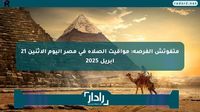On April 21, 2025, Muslims across Egypt will observe the prayer timings for the day, which hold significant importance for their daily worship routines. The General Authority for Surveying has officially announced the prayer times, allowing individuals to plan their day around these sacred moments.
In Cairo, the first prayer of the day, Fajr, is scheduled for 3:49 AM. This is followed by the Dhuhr prayer at 11:54 AM, Asr at 3:30 PM, Maghrib at 6:26 PM, and Isha at 7:48 PM. Each of these prayers serves as a reminder of the importance of faith and community in the lives of Muslims.
Alexandria, another major city, will have its Fajr prayer at 3:52 AM, with the Dhuhr prayer occurring at 11:59 AM, Asr at 3:36 PM, Maghrib at 6:33 PM, and Isha at 7:56 PM. The timings reflect a slight variation from Cairo, showcasing the local adjustments made according to the geographical location.
In the city of Ismailia, the timings are set as follows: Fajr at 3:44 AM, Dhuhr at 11:50 AM, Asr at 3:26 PM, Maghrib at 6:23 PM, and Isha at 7:45 PM. This consistency in prayer times across various regions underscores the unity of purpose among Muslims in Egypt.
Sharm El-Sheikh, a popular tourist destination, will have its Fajr prayer at 3:42 AM, followed by Dhuhr at 11:41 AM, Asr at 3:15 PM, Maghrib at 6:11 PM, and Isha at 7:31 PM. The timings are crucial for both residents and visitors who wish to observe their prayers while enjoying the scenic beauty of the area.
Aswan, located further south, will have its Fajr prayer at 3:56 AM, Dhuhr at 11:47 AM, Asr at 3:14 PM, Maghrib at 6:13 PM, and Isha at 7:29 PM. These timings reflect the local adjustments necessary due to the variations in daylight hours.
The significance of these prayer timings is not just in the act of praying but also in the community it fosters. As emphasized by religious teachings, communal prayers strengthen bonds among individuals. The Prophet Muhammad (peace be upon him) stated, "The prayer in congregation is twenty-seven times greater than the prayer offered alone" (Sahih Bukhari). This highlights the spiritual and communal benefits of performing prayers together.
For those in Giza, the prayer times are nearly identical to those in Cairo, with Fajr at 3:49 AM, Dhuhr at 11:54 AM, Asr at 3:30 PM, Maghrib at 6:26 PM, and Isha at 7:48 PM. This consistency across the governorates allows for a unified approach to worship.
In Port Said, the Fajr prayer is set for 3:42 AM, with Dhuhr at 11:49 AM, Asr at 3:27 PM, Maghrib at 6:23 PM, and Isha at 7:47 PM. The locals often rely on these timings to structure their day effectively, balancing work and worship.
Additionally, Al-Ghardqa, a city known for its tourist attractions, will see its Fajr prayer at 3:46 AM, Dhuhr at 11:43 AM, Asr at 3:15 PM, Maghrib at 6:12 PM, and Isha at 7:32 PM. This city, like many others, embraces the significance of prayer times in daily life.
In Al-Uqsur, the prayer schedule includes Fajr at 3:53 AM, Dhuhr at 11:48 AM, Asr at 3:18 PM, Maghrib at 6:16 PM, and Isha at 7:34 PM. The timings reflect the cultural and religious dedication of the residents.
As the day progresses, it is essential for Muslims to adhere to these prayer timings to maintain their spiritual connection and discipline. The importance of prayer is echoed in various teachings, where it is noted that the first thing a person will be questioned about on the Day of Judgment is their prayer (Sunan Ibn Majah).
With the advent of technology, many individuals now rely on mobile applications and online platforms to keep track of these prayer times accurately. This has made it easier for people to stay informed, especially in a fast-paced world.
As the sun rises and sets, the prayers serve as a reminder of the divine presence in the lives of believers. Each prayer time marks a moment to pause, reflect, and connect with God, reinforcing the faith that guides their lives.
In conclusion, the prayer timings for April 21, 2025, across various governorates in Egypt not only assist individuals in fulfilling their religious obligations but also serve as a unifying force within the community. These moments of prayer are essential for fostering spiritual growth and maintaining the bonds of brotherhood among Muslims.




